If you don’t know Jerry Coyne, he’s something akin to the American Richard Dawkins—an evolutionary biologist who’s convinced that unguided typographical errors in genetic code produced the gamut of life on Earth, as well as someone sold on the idea that religion is an evil standing in the way of the Even More Enlightened Age of Western Science #CantWait. Mercifully, he spends less time personally tweeting than Dawkins, but he does have a penchant for writing multiple blog posts a day.
Recently I spied a blog post he wrote on one of his favourite topics—Islam. The post is a wonderful demonstration of the kind of New Atheist nonsense that seeks to demonise religions based on the actions of a few, though Coyne is blissfully unaware of this—in fact, he seems to think that he’s making unanswerable arguments for his inflammatory assertions. His lack of scholarship, or even anything approaching scholarship, is an obvious abuse of his influence. Coyne is a best-selling author with ~40,000 subscribers to his blog, doubtless many more regular readers, and a frequent speaker and writer on issues relating to Atheism. This year, Coyne was the keynote speaker at one of the British Humanist Association’s flagship annual events. As expected, his arguments against Islam follow the same kind of logic as those of his comrade-in-arms Sam Harris, and, like Harris, Coyne’s scientific background give him an air of intellectual authority which, as will be demonstrated, is completely undeserved.
Is Islam Responsible for Terrorism?
The whole post is a belter, but to cut to the chase Coyne argues that Islam’s core teachings themselves act as the primary driver of terrorism committed by Muslims. To support his thesis, (a generous word in this context), Coyne does not cite a single verse of the Qur’an. He doesn’t even cite any of the practices of the Prophet Muhammad, or the recorded sayings, i.e.: nothing of the primary Islamic source material. In his mind he doesn’t have to, and for good reason:
“Islamic terrorists repeatedly tell us the reasons for their deeds, reasons which almost always involve religion. “Allahu Akbar,” they cry as they pull the triggers of their Kalashnikovs. Yet we Westerners won’t listen…”
Note that, coming at the issue fresh, Coyne may be absolutely right. It’s entirely possible that Islam’s fundamental teachings could be a core driver of Islamic terrorism. But to do so, you’d have to actually make the argument. You’d have to demonstrate how Islam’s teachings, when fairly construed, instruct its adherents to find a kalashnikov and fire it. You’d also have to explain why the vast, vast majority of Muslims aren’t terrorists; why Muslim terrorism rocketed upwards only when Muslim countries were invaded by foreign powers; why the kinds of people that have left to fight for ISIS order books like ‘Islam for Dummies’; why a French journalist taken hostage by ISIS reported his captors knew nothing of the Qur’an and hammered on about politics; why a leaked ISIS report admits most of their recruits have only ‘basic’ knowledge of Islam; why an MI5 report found, in the words of a Guardian summary:
“Far from being religious zealots, a large number of those involved in terrorism do not practise their faith regularly. Many lack religious literacy and could actually be regarded as religious novices. Very few have been brought up in strongly religious households, and there is a higher than average proportion of converts. Some are involved in drug-taking, drinking alcohol and visiting prostitutes. MI5 says there is evidence that a well-established religious identity actually protects against violent radicalisation.”
So according to a world-leading intelligence agency, knowing more about Islam and following it doesn’t lead to radicalisation, but protects against it. That seems fairly contrary to Coyne’s arguments. But if you think these kinds of questions will give him pause for thought, then you’d be sorely mistaken. You see, such arguments stray far too close to insight, deeper analysis and a willingness to penetrate past the most superficial understanding of events for Mr. Coyne. Says he:
“When you hear the word “nuance” in arguments like this, you should see red flags flapping madly.”
He’s a brave man who will so brazenly disavow intellectual rigour—for this Coyne should be applauded, if only whilst backing away slowly.

What do the polls tell us?
In order to support his claims that Islam teaches all manner of extreme things, Coyne cites data from Pew Research Polls, following which he writes,
“It really is hard to look at these data and claim that, worldwide, Muslims are liberal, loving, and tolerant, and that Islam is a “religion of peace.””
The hilarious thing is that the polls are perhaps the best argument against his thesis that there is a direct causal link between the teachings of the Qur’an and certain extreme beliefs held by some Muslims. Were that the case, what you’d expect to see is a consistently high level of agreement in the areas questioned, regardless of the demographic sampled. What the polls actually show is a staggering level of diversity of views:
On the question of stoning as punishment for adultery, 79% of Muslims in Bosnia disagree with this, Indonesian Muslims are roughly evenly split, whilst 89% of Pakistani Muslims agree with this. On whether apostates should receive the death penalty, only 4% of Kazakh Muslims agree, the Lebanese are split near the middle, whilst 86% of Egyptians agree. On whether Islamic law should constitute their country’s civil law, only 8% of Azerbaijanis agree, 56% of Tunisians agree, and 86% of Nigerians agree. On the question of homosexuality’s moral impermissibility there is widespread agreement. Interestingly however, this last datum is hardly Islam-specific, with widespread moral condemnation of homosexuality across Africa and Russia, with 1 in 2 Americans also finding themselves in agreement.
Some of the poll results cited seem to be poorly phrased. On the question of whether a wife must always obey her husband, there is diversity from 34% in eastern europe to over 90% in MENA. Interestingly however, the question is extremely poorly phrased, asking whether Muslims ‘completely’ or ‘mostly’ agree that a wife must always obey her husband. Frankly, I know of few husbands who would disagree with the idea that their wives should mostly listen to them. Another poll asks whether ‘sharia’ is the word of God or something inspired by the word of God. Again, the question sparks a diversity of responses in every country, understandable given that the word ‘sharia’ can refer both to the actual teachings of the Qur’an, as well as their application by later Muslim Jurists.
Apart from these results cited, the only other data presented tell us that Muslims show more agreement in finding prostitution, suicide, extramarital sex, alcohol intake, abortion, and euthanasia morally wrong. How extreme—apparently. I can only assume Jerry ducks for cover every time he sees a Priest or Rabbi in his hometown of Chicago.
And that’s it.
Based on that, this bestselling author traces a clear line between Islam and kalashnikovs. Coyne doesn’t bother to address why there is such diversity of views on so many issues. Could it be that there are factors which affect the beliefs of Muslims fourteen centuries after the advent of Islam, other than the Qur’an’s original teachings? Could it be that educational factors, economic factors or socio-political factors affect which teachings take hold in a society at any given time?
We’ll never know.
The Polls that Coyne Left Out
What we may know, but no thanks to Coyne, are all the opinions of contemporary Muslims that Coyne omitted because they don’t support his bigoted worldview. Here are just a few:
Along with these, Pew write:
“Muslims around the world strongly reject violence in the name of Islam. Asked specifically about suicide bombing, clear majorities in most countries say such acts are rarely or never justified as a means of defending Islam from its enemies.” (pg. 29)
They also say:
“Most Muslims around the world express support for democracy, and most say it is a good thing when others are very free to practice their religion.” (pg. 32)
And what about this?
“Most Muslims are comfortable practising their faith in the contemporary world. Relatively few feel there is an inherent conflict between being religiously devout and living in a modern society, and the prevailing view in most countries surveyed is that there is no inherent conflict between religion and science.” (pg. 34)
And whilst harping on about how so many Muslims want to force Sharia on everyone, he fails to mention this:
“Among Muslims who support making sharia the law of the land, most do not believe that it should be applied to non-Muslims.” (pg. 48)
Unlike Coyne’s fear-mongering blogging, the original results of the Poll make for fascinating reading, and can be read in their unadulterated version here.
Do the Beliefs of Muslims Necessarily Represent Islam?
Let’s put aside the fact that the polls Coyne managed to cite do not support Coyne’s assertion that Islam motivates terrorism, and that the polls Coyne neglected offer powerful evidence against it. It is obvious that some Muslims do have what most people regard as extreme beliefs. However, to simply blame Islam for their beliefs demonstrates the core problem often found in the shallow critiques of Islam that New Atheists tend to make: a total inability to differentiate between the teachings of the religion, and the modern day beliefs and actions of its professed adherents. New Atheists seem incapable of realising that it may just be possible that Muslims around the world could have different levels of knowledge or ignorance about what the Qur’an actually teaches; that many modern day Muslims have no idea what the arabic itself says and simply rely on a decadent and corrupt clergy to tell them their own self-serving interpretations. This intellectual agnosia is perhaps deliberate—it is far easier to support the worldview that religion = bad, science = good if one can simply avoid ever having to find out what a religion genuinely teaches. Doing so would be detrimental to your cause, and veer ever closer to that dreaded nuance most rational human beings seek.
Could Muslims be Islamic Extremists if Islam Didn’t Exist?
After deploying the argument from Kalashnikov, Coyne goes on to say:
“…Westerners won’t listen: they argue that terrorism sprouts from boredom, disaffection, lack of something meaningful to do, or even Western colonialism. And yes, these factors play a role, but sans Islam, would they find an outlet? In reality, a death sentence for blaspheming Muhammad or for leaving the faith (see above), or the forced wearing of burqas and the stoning of adulterers—these acts have no meaning without Islam. How can you kill someone for blaspheming or leaving Islam if the religion didn’t exist?”
Aside from the fact that Coyne seem to think that experts believe terrorism sprouts from tedium, and even conceding that foreign policy, (a factor constantly cited by terrorists themselves), could play a motivating role, Coyne employs a completely circular argument. He asks whether female subjugation, restrictions to freedom of conscience and fatally excessive punishments for moral crimes would exist amongst Muslims if Islam hadn’t come around.

The cover of the membership card of the Union of Militant Atheists
Well, if Islam hadn’t existed, these people wouldn’t be Muslim so its a moot point. But the idea that these evils wouldn’t exist without Islam is totally absurd. If they were found only after the advent of Islam and only among Muslims, perhaps Coyne would have a leg to stand on, but self-evidently they did not and do not. These are human evils that crop up in societies of every ideology. In fact, perhaps the greatest abuse of freedom of conscience the world has ever seen occurred under atheistic Communist Regimes of the 20th century, where alternative ideologies were brutally suppressed, leading to tens of thousands of religious clergy and devotees murdered by groups like The League of Militant Atheists.Humanity has hardly done well anywhere in terms of women’s rights, and a sane reading of Islamic teaching would show that it revolutionised women’s rights a full millennium before the western world came anywhere close, as will be briefly explained below. And ironically, the stoning of adulterers is a Biblical teaching, not a Qur’anic one.
Would Terrorism Exist Without Islam?
As for whether terrorism per se would exist without Islam, only one completely blinkered by prejudice and ignorance would argue this. Between 1970-2012, only 2.5% of terrorist attacks on US soil were done by Muslims. 93% were inspired by secular causes. In Europe, the picture is even more clear. Data from 2010-2014 show that Muslim terrorism constitutes about 2% of terrorism here. The rest was politically and socially motivated, primarily driven by ethno-separatism. Worldwide, Muslim terrorism has only rapidly proliferated after the invasions of Iraq and Afghanistan, displacing the extremist philosophy of a few extremists to become the rallying call of thousands. Still, according to the Global Terrorism Index, over the last decade four of the top ten leading terrorist organisations worldwide are secular or non-Muslim, including the Maoists in India, the Tamil Tigers in Sri Lanka, FARC-EP in Columbia, and the Ugandan Christian Extremist group, the Lord’s Resistance Army (LRA). Terrorism of course is not limited to these, with Buddhist extremists in Burma becoming more active in recent years, and Zionist extremists in Israel and Palestine claiming countless lives too in the last few decades. Though I may be mistaken, something tells me Coyne won’t be writing too many blog posts on how Christ, Buddha, and Moses are responsible for the actions of their ostensible followers.
Extremism is Human, not Divine
The reality is that it is people who have a dark side, and as such will seek to twist and corrupt any ideology, however good, for their own ends. Whenever an influential class in society seeks to trample on the rights of others for their own good, they appeal for justification to whatever ideology has the most currency in their society. In religious societies, they will appeal to religious authority, and twist scripture in such a way so as to justify their own moral depravity. In less religious societies, it is noble ideals like democracy, freedom, and justice that are appealed to so as to justify state terrorism and systematic oppression. To unthinkingly blame the ideology to which extremists subscribe, and not the individuals, is a lazy and dangerous way of thinking. Coyne has little issue with this however:
“And since Islam is a form of ideology, —”Islamism” is the widespread view by Muslims that their religion should guide politics (see the sharia graph above)—is it any more wrong to blame Islam on Muslim terrorism than to blame the genocide of Jews on the religiously-motivated, anti-Semitic ideology of the Nazis?”
To draw a parallel between Nazism and Islam is both stunningly inaccurate and shockingly irresponsible, especially in a post complaining about the overuse of the word ‘Islamophobia’. The example of Nazism that Coyne uses is also another shot into his own foot, (which must be rather sore by now), given that Christ did not promote the systematic murder of Jews. Rather, the Nazis were actually influenced by Darwinism, hence the survival of the fittest motif that ran through their ideology and war crimes. Needless to say, neither Darwin, nor his well-meaning theory of biological evolution are responsible for the crimes of the Nazis, however much eugenics found its justification in Darwinism. This should act as a cautionary tale for Coyne and his ilk before they blame Islam for Muslim terrorism, but then again reckless abandon seems to be the order of the day for New Atheists
What does Islam actually teach?
As I’ve reiterated, Coyne inability to demonstrate that Islam prescribes the beliefs against which he argues is his main downfall, compounded by the intellectual hubris that characterises the New Atheist movement. As mentioned near the beginning, it is entirely possible that Islam does directly inspire extremism, though why the majority of Muslims have been and remain peaceful in history would take some explaining. However, the argument for this has to be made and not assumed. As a measure of goodwill, to counter this absent argument, presented below are some explanations of the true teachings of Islam on the subjects to which Coyne, often rightfully, objects. These explanations are in no way comprehensive, but serve to highlight the disparity between certain modern day Muslim governments and the teachings of the Qur’an.
Freedom of Conscience
The Qur’an is unwavering in its support for freedom of conscience of all peoples. It says, ‘there should be no compulsion in religion,’ (2:257) that even the Prophet Muhammad is simply an ‘admonisher’ and is not permitted to compel people into belief (88:22), that his ethos was ‘to me my religion, and to your religion’ (109:7)
(You can find out more about freedom of conscience in Islam here).
Punishment for Blasphemy
Again, the Qur’an does not prescribe any punishment for blasphemy. On the contrary, the Prophet of Islam was repeatedly abused and profaned, but in line with the Qur’an he chose to ‘bear patiently what he said,’ (20:131) and to ‘turn away’ from the slanderers and ‘keep on preaching’ (51:55) to those who would listen. Blasphemy laws have no place in Islam, and simply reflect the totalitarian impulse against dissent found in many non-Islamic governments both past and present.
(You can find out more about the supposed punishment for Blasphemy in Islam here).
Stoning to death for adultery
As mentioned, this is actually a Biblical punishment. It has zero grounding in the Qur’an. I challenge any reader to find this punishment in the Qur’an. The only mention the Qur’an makes to stoning is in reference to how the Prophets of God were stoned by their persecutors. Muslim countries following this Biblical idea are sorely mistaken and not representative of Islam.
(You can find out more about the issue of adultery from the Qur’anic perspective in this article, and this video).
Oppression of Women
Islam revolutionised women’s rights a full fourteen centuries before the West managed to get around to it. The Qur’an gave women unequivocal rights of divorce, inheritance and education. Women are given their freedoms to go out of the house, earn a living, and help shape society through their voices and their actions. The greatest scholar in Islamic history is widely regarded as Ayesha, a woman, and it was a Muslim woman who founded the world’s first university. Caricaturing Islam by the fact that the brutally oppressive Saudi regime doesn’t even let women drive is easy to do, but has no bearing on what Islam actually teaches.
(To find out more about women’s status in Islam, I’d recommend this video of a talk I once chaired given by a Muslim female scholar; this article, or this article).
Jihad
Jihad means to struggle for a greater cause, and in most cases used in the Qur’an applies to the struggle Muslims face to improve their moral and spiritual characters. However, the Qur’an does sanction Muslims to fight in self-defence when they are being slaughtered by their persecutors, and all other avenues are exhausted. This is amply demonstrated, and perfectly rationalised, in the verses which originally permitted the Muslims to fight:
“Permission to fight is given to those against whom war is made, because they have been wronged — and Allah indeed has power to help them.
Those who have been driven out from their homes unjustly only because they said, ‘Our Lord is Allah’ — And if Allah did not repel some men by means of others, there would surely have been pulled down cloisters and churches and synagogues and mosques, wherein the name of Allah is oft commemorated. And Allah will surely help one who helps Him. Allah is indeed Powerful, Mighty” (Qur’an; 22:40-41)
Note how the permission came with the rationale that if religious persecution is allowed to spread unchecked, it will expand to threaten people of all faiths, with Islam mentioned last. Subsequent verses which refer to fighting disbelievers must be understood in this context alone, and not in a general sense. The general teaching in times of peace is outlined in the following verse:
“Allah forbids you not, respecting those who have not fought against you on account of your religion, and who have not driven you forth from your homes, that you be kind to them and act equitably towards them; surely Allah loves those who are equitable.” (Qur’an; 60:9)
(You can find out more about Jihad here).
New Atheism, Old Bigotry
New Atheism is built on the twin edifices of religion’s evil, and science’s ability to supplant theistic explanations. Coyne is a well-known figure of the movement, though even his Islamophobia, (here meant in both its prejudicial and irrational fear senses), is eclipsed by its leading proponents. Richard Dawkins famously compared the Qur’an to Mein Kampf, whilst bewilderingly saying he’d never bothered to read it; Sam Harris also replaces an analysis of its teachings with selective poll results, leading him to openly contemplate pre-emptive nuclear strikes against Muslim nuclear countries; and Christopher Hitchens, who so often opted for eloquence over insight, or… any knowledge of the Qur’an. Coyne is thus one of many voices in a cacophony of ignorance on Islam reverberating from the New Atheist podium, opining on a subject of which he has so little knowledge, and so much prejudice. Perhaps commentator Nathan Lean put it best when he wrote:
“That backwards equation — insisting on a conclusion before even launching an initial investigation — defines the New Atheists’ approach to Islam. It’s a pompousness that only someone who believes they have proven, scientifically, the nonexistence of God can possess.”
There is no reason why the approach to religion of New Atheists should be different to their approach to science. In the religious domain, we have seen from these minds over and over again a willingness to let their pre-determined worldview colour their interpretation of evidence. This should act as a cautionary tale to thinking atheists as to how much stock they should place in their treatment of scientific discoveries. Does the nature of the universe, the origin of life and its subsequent evolution really yield no evidence for the wider claims of religions? These are issues beyond the scope of our current focus, but if we have learnt anything it is that an opening of minds beyond the traditional New Atheist claims is warranted, if not urgently necessary.





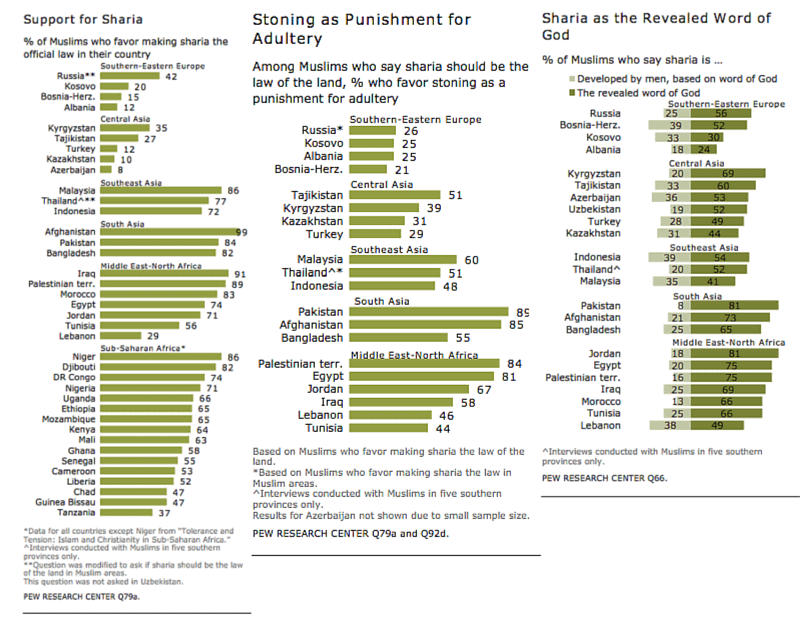
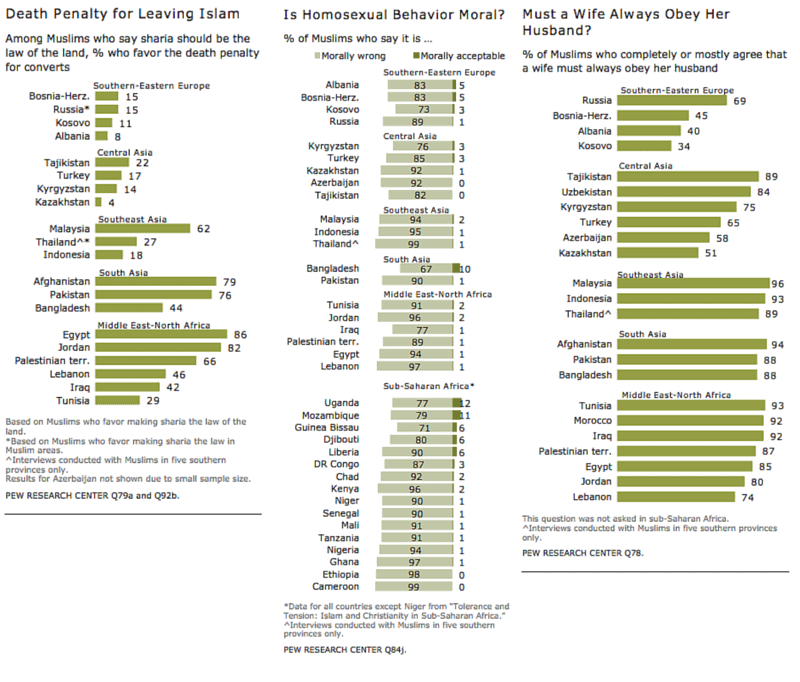
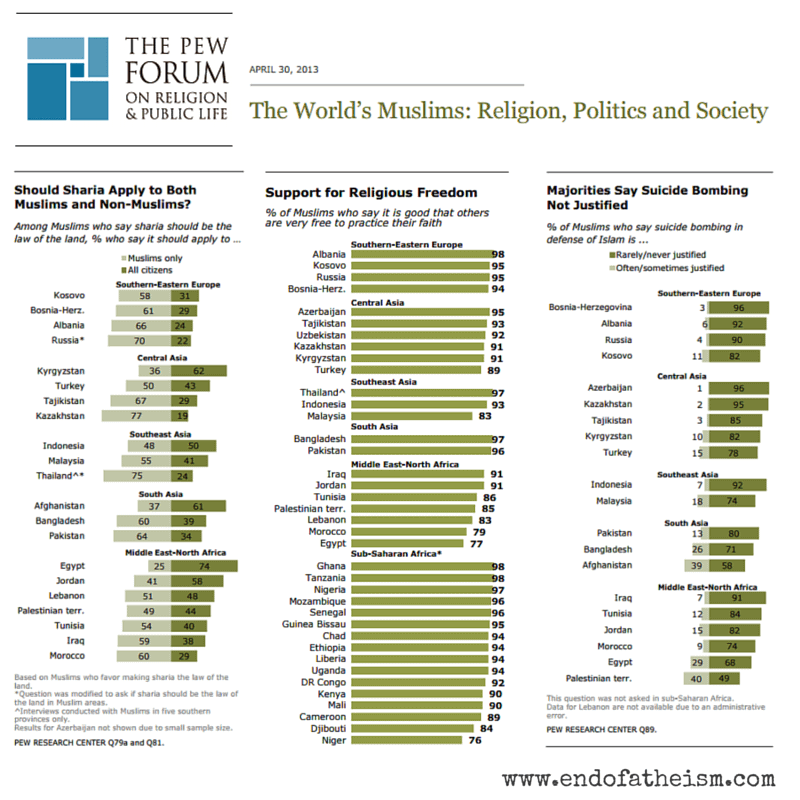



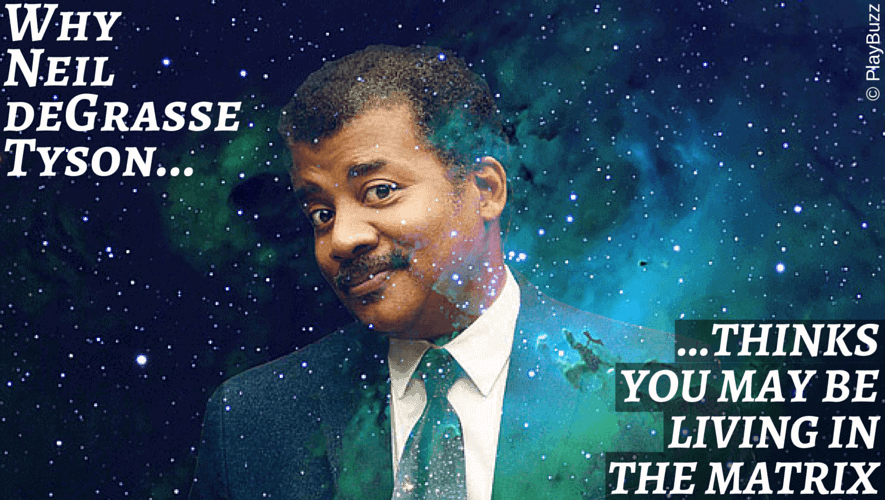

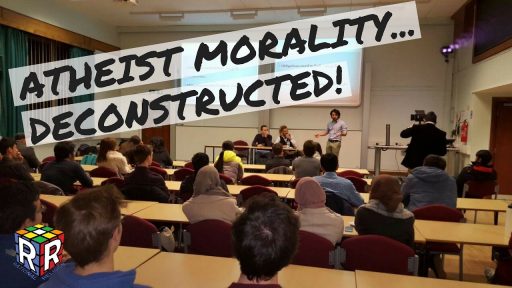
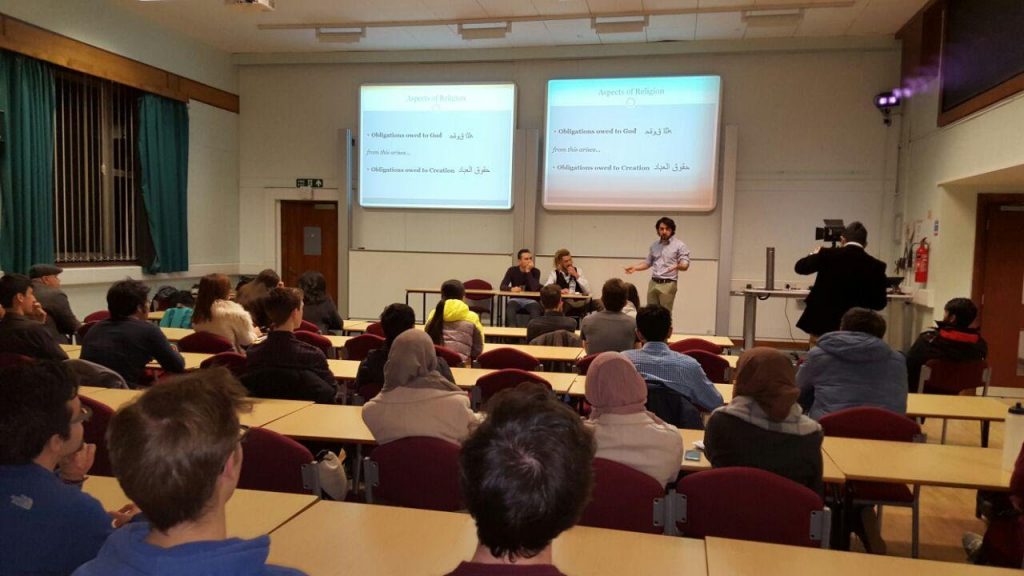
New Atheists are exclusivelly anti-biblical literalism, this is why in any other topic they make they racism and bigotry loud and clear and with nothing constructive to say.
It’s kind of sad. Imagine if all that energy went into something constructive!
5
0.5